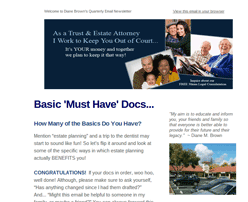What Assets Should Be in the Name of the Trust?
Categories: Estate Planning, Living Trusts, Power of Attorney Finances
 Clients often have questions about whether their assets should be in their personal name or in the name of the trust. In addition, there is often confusion regarding the difference between a Successor Trustee and the person to whom you have assigned Durable Power of Attorney for Finances. With any luck this article will clear these things up for you!
Clients often have questions about whether their assets should be in their personal name or in the name of the trust. In addition, there is often confusion regarding the difference between a Successor Trustee and the person to whom you have assigned Durable Power of Attorney for Finances. With any luck this article will clear these things up for you!
Remember, if you have additional questions, let me know. More info on that at the end of the post.
Q & A Durable Power of Attorney for Finance
In the coming months, our attention will likely turn to money and taxes. Very often it’s this time of year when people decide to get serious about estate planning. Let’s look at the basics and a some questions that new clients often ask.
The Basics – Durable Power of Attorney is a document. A trustee is a person or entity. An agent under a Durable Power of Attorney (aka DPA) handles non-trust assets. A trustee handles trust assets. Usually you name the same person for both positions.
Q. If I have a living trust to manage my assets why would I need a Durable Power of Attorney for Finances? A. The successor Trustee of your trust can manage your trust assets if you become incapacitated. The key is that the assets are in the name of the trust.
Q. Shouldn’t all my assets be in my trust? A. Not always. Any retirement account that is tax deferred will be in the individual’s name and not in the name of the trust. If such an asset is transferred to the name of the trust it is treated as a taxable distribution from the retirement account.
Q. What do you mean by retirement accounts? Is my federal pension a retirement account? A. Usually a federal or state pension is an income stream and not an asset. To be an asset, there must be value payable after your death to a beneficiary.
Q. Then what are you talking about? A. Examples of retirement accounts that are tax deferred are IRAs, 401ks, etc.
Q. How do these retirement accounts get into my trust? A. Here is where you want to make very informed decisions! You can get retirement accounts get into a trust by making the trust the beneficiary. However, use caution and see your attorney! Usually you will make a spouse the primary beneficiary and the trust the secondary beneficiary. Making the trust the primary beneficiary may not result in the best outcome for income taxes. Again, see your attorney for questions about your own situation.
Durable Power of Attorney for Finance and Trusts
Have more questions about Durable Power of Attorney for Finance and what assets to name in your trust? I know it can sometimes seem confusing, especially if there are added stresses involved. I fine information helps. As you begin to understand things it all somehow becomes more manageable. Best to get clear on things now and make sure everything is set up the way YOU would like it to be!
To that end, if you live in San Jose, the South Bay or on the Peninsula, you are welcome to set an appointment for a free consultation at my office. There is no obligation, it is simply a way for you to better understand your options, so you can decide what is best for you.
 Diane M. Brown, Esq.
Diane M. Brown, Esq.
Working every day to keep my clients out of court!
It’s your money… Let’s keep it that way!
Call 408-364-1234
This blog contains general information and is not meant to apply to a specific situation. Please seek advice of counsel before proceeding as each case is unique.
Photo Credit: Diane Brown’s photo by Lisa Whalen and a special thank you to Corbis via the Microsoft Image Library for the use of additional images found in this blog post.






No comments yet.